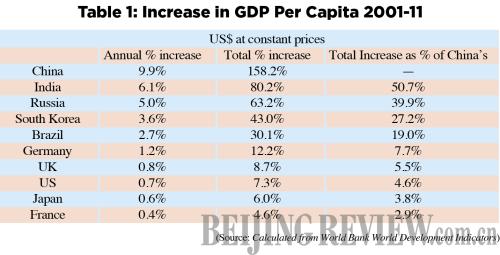|

China is rapidly approaching its once-in-a-decade change in president and government, which seems an appropriate time to survey the country's economic performance over the last decade. As the economic data for 2012 is not yet in, the decade will be taken as 2001-11. Strictly speaking, this period includes a year of China's previous administration; but this is merely a statistical quibble as nine 10ths of the period was overseen by the present government.
Some statistics over that 10-year period are well-known: China became the world's second largest economy and the world's largest goods exporter. But such statistics greatly underestimate the scale of China's economic achievement. The last 10 years in China's economy may be summed up with two overwhelming facts which place all other economic data in context:
- In the last decade China experienced the fastest growth in GDP per capita of any major economy in human history.
- Translated into living standards, this means that in the last 10 years, China has experienced by far the fastest consumption growth rate of any major economy.
These astonishing achievements are worth exploring in more detail.
China's annual average GDP per capita growth in the last 10-year period was 9.9 percent. The total increase in GDP per capita over the decade was 158 percent. Historically, as shown in World Bank data, and for earlier periods in Angus Maddison's standard work World Population, GDP and GDP Per Capita 1-A.D. 2006, this makes China's the fastest rate of increase ever recorded by a major economy. This figure is all the more extraordinary when one considers that it includes the period since 2008, which has seen the most serious international economic crisis in 80 years.
In terms of contemporary economic comparisons, no other major economy remotely approaches China's scale of economic growth during this 10 year period. The data for the largest G7 economies, the BRICS countries and South Korea, are set out in Table 1. China's 158 percent increase in GDP per capita over the period is almost twice that of the next best performing major economy—India. In addition, China's growth was two-and-a-half times Russia's, more than three times South Korea's, seven times Germany's and 20 times the United States'.
As a foundationless myth is peddled in some sections of the media that China's economic growth has not translated into an increase in its population's consumption, it is also useful to note the data for this. As all countries' statistics for 2011 are not yet available, the period of 2000-10 will be taken. The total increase in China's consumption per capita in that period was 103 percent—again the highest recorded by any major economy. The data is set out in Table 2. Only Russia's increase in consumption compares to China's—and Russia's was, in significant part, due to its recovery from a long period of depression. China's total rate of increase in consumption was 57 percent higher than India's, three times South Korea's, almost 10 times that of the United States, and almost 16 times that of Germany. In short, far from being slow, China's consumption growth rate was far more rapid than that of any other major economy.
This achievement also casts light on another issue—denial of elementary economic facts by those who regularly predicted that China's economy would fail during this period. It would take too much space to make a comprehensive list, so here are some highlights.
- Fallacy: The Economist magazine's special supplement, "Out of Puff," published in June 2002, claimed: "In the coming decade, therefore, China seems set to become more unstable. It will face growing unrest as unemployment mounts." It went on to argue: "The [Chinese] economy still relies primarily on domestic engines of growth, which are sputtering. Growth over the last five years has relied heavily on massive government spending. As a result, the government's debt is rising fast. Coupled with the banks' bad loans and the state's huge pension liabilities, this is a financial crisis in the making."
Reality: Instead of "crisis," China experienced the most rapid growth ever in GDP per capita of any major economy.
Fallacy: Gordon Chang predicted in The Coming Collapse of China in 2002, "A half-decade ago the leaders of the People's Republic of China had real choices. Today they do not. They have no exit. They have run out of time."
Reality: Instead of "collapse" China experienced unprecedented economic growth.
- Fallacy: When the international financial crisis erupted, Michael Pettis of Peking University in 2009 reiterated, "I continue to stand by my comment [made] last year ... that the United States would be the first major economy out of the crisis and China one of the last."
Reality: In fact, in the four years since the international financial crisis began, China's economy has grown by 40 percent and the U.S. economy by 1 percent.
Such statements, and many more like them, are not errors of predictions on details, which are inevitable; they are examples of analyses which simply got it wrong in predicting the entire trajectory of China's economy. To predict "sputtering," "crisis" or "collapse" when China experienced its remarkable growth, if rational standards of debate were used, should lead to the discounting of future prognostications based on these analyses. It is a measure of unscientific bias that Gordon Chang continues to be retained as a "China expert" by Forbes and that Michael Pettis is still printed in the Financial Times predicting 3 percent growth in China. Given their prolonged failure to withstand the test of facts, such views may be discounted.
Do China's quite extraordinary economic achievements mean that it is free from any problems? Evidently not, but it simply means that they must be placed in context. No other major country in human history has ever experienced such rapid economic growth as China in the last 10 years, and no other major economy has witnessed such a rapid growth in the population's consumption in the last decade. These are truly awesome economic facts. Anyone who believes in rational fact based economic discussion has to register not only the scale of such an extraordinary achievement but also how completely it refuted the analyses of those predicting any deep crisis in China's economy.


The author is a visiting professor at Antai College, Shanghai Jiao Tong University
Dear Readers,
"Forum" is a column that provides a space for varying perspectives on contemporary Chinese society. We invite you to submit personal viewpoints on past and current topics (in either English or Chinese).
E-mail us at: zanjifan@bjreview.com
Please provide your name and address along with your comments. | 